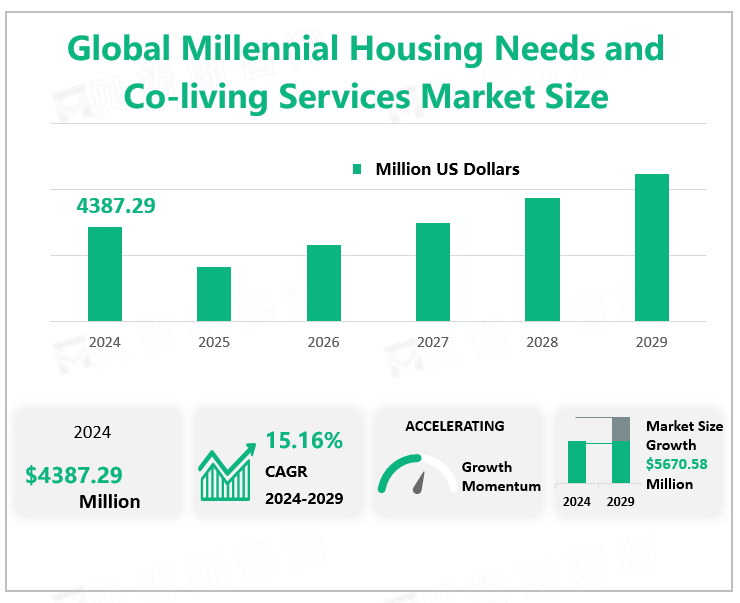Global Millennial Housing Needs and Co-Living Services Market Overview
According to Global Market Monitor, the global millennial housing needs and co-living services market size is $4387.29 million in 2024 with a CAGR of 15.16% from 2024 to 2029.
The housing needs and co-living services of millennials refer to services that assist with the housing of millennials. Co-living is a modern form of communal living in which residents get a private bedroom in a furnished home with shared common areas. Young professionals move in with like-minded people, sharing service costs and benefiting from flexible rental terms. Co-living is popular in major cities as a means of affordable living for students, workers, digital nomads, or individuals relocating.

Advantages of co-living
The benefits of co-living are many, including affordability, amenities, a sense of community, a thriving location, and flexibility. Sharing is typically 15%-20% less expensive than renting a studio in the same market. Co-living does not require a high credit score or deposit, and the lease terms are more flexible than traditional apartment rentals. Co-living provides tenants with shared workspaces and amenities, eliminating many of the hassles that come with moving, including dealing with agents, finding roommates, furnishing the entire apartment, housekeeping, and more. For recent graduates moving to a new city or anyone interested in expanding their urban community, co-living offers the opportunity to meet new people outside of the workplace and is a great way to make other business collaborations. Co-living allows young renters to live in central areas and neighborhoods without having to pay a one-time fee.
Additionally, co-living can significantly reduce negative environmental impacts. Co-living complexes and co-working spaces use common spaces to share basic resources such as water and electricity. This helps implement a more sustainable approach to energy consumption, supporting a reduction in carbon footprint. Although co-living spaces are currently awash with youthful, trendy marketing messages, there are reports that Generation X and baby boomers are beginning to embrace the minimalist lifestyle of co-living. Therefore, the advantages of co-living such as price and convenience are expected to drive market growth in the Millennial Housing Needs and Co-living Services industry.
Change in consumption concept
Contrary to the tradition of their parents, millennials are now usually in no rush to buy a house and live with their partners before getting married. The millennial generation does not seem to care about the traditional concept of buying a house, nor is it eager to create their own young family. In fact, for example in New York, millennials are more inclined to keep pets than have children. The general trend is that millennials will give birth to children later than their parents, so their urgency to buy a house has been delayed and their rental time has increased.
|
Drives |
Residents in many areas have high debt ratios. Millennial Housing Needs and Co-living Services provide solutions to housing crises. Change in consumption concept Global housing prices increase with economic growth, population growth, and other factors. |
We provide more professional and intelligent market reports to complement your business decisions.